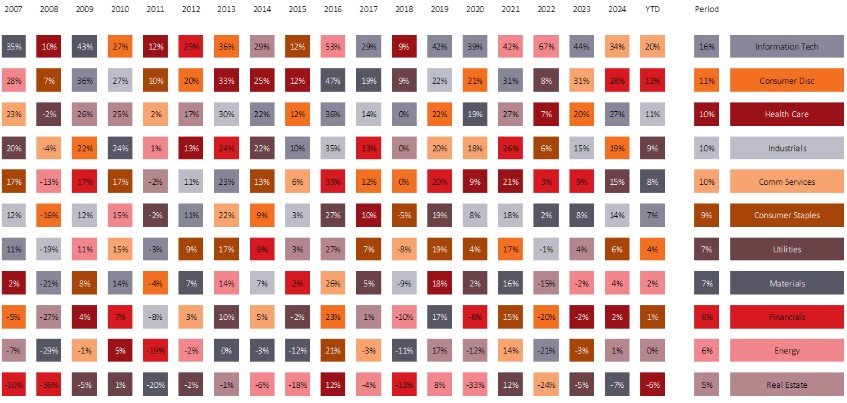Avoiding the lure of past performance
Each day, month and year brings a fresh wave of predictions about which markets, sectors, or asset classes will outperform. Financial headlines continue to highlight the latest themes - whether it’s the rise of AI-driven companies, the growing adoption of cryptocurrencies, or the apparent resurgence of gold as a safe haven asset. Despite the persuasive narratives, investors should remain cautious about reorienting their portfolios based solely on these forecasts. As history has shown, economies and markets are inherently unpredictable.
Each year, the leading and lagging sectors shift in surprising ways, defying attempts to consistently identify winners ahead of time. For example, recent years have seen technology stocks oscillate between market leader and underperformer. Such volatility highlights the challenges of relying on past trends as a guide for future decisions. Note that a diversified exposure to all of these sectors provides investors with a smoother journey through time, and the confidence that one can benefit from the sector that dominates in future.
Figure 1: Sector returns Jan 07 to Aug 25 | Data: see footnote[1]
It’s important to recognise that even sophisticated investors, equipped with vast amounts of data and analysis, rarely succeed in consistently outguessing the market. Recently published results showed that in the 10 years to the middle of 2025, 97% of professional UK-based global fund managers have failed on their promise to deliver above market returns. This is a damning result[1].
Unforeseen events - geopolitical shocks, policy changes, or sudden shifts in consumer behaviour - are swiftly reflected in stock prices, making it nearly impossible to anticipate every twist and turn.
Ultimately, while it is tempting to adjust investment strategies in response to compelling forecasts or recent performance, a disciplined, long-term approach remains the most prudent path. The graphic above shows the randomness inherent in markets and the risks of chasing yesterday’s winners. As always, investors should focus on diversification and their long-term objectives rather than being swayed by short-term trends.
“The only function of economic forecasting is to make astrology look respectable”
Ezra Soloman, Economist
[1] iShares Global Comm Services ETF, iShares Global Consumer Discr ETF, iShares Global Consumer Staples ETF, iShares Global Energy ETF, iShares Global Financials ETF, iShares Global Healthcare ETF, iShares Global Industrials ETF, iShares Global Tech ETF, iShares Global Materials ETF, iShares Dev Mkts Prpty Yld ETF USD Dist, iShares Global Utilities ETF
[1] S&P Global: SPIVA Europe Mid-Year 2025. GBP-denominated funds, ‘Global Equity’ category. For reference, other categories did not show any material improvement in results (‘Europe Equity’: 88%, ‘UK Equity’: 87%, ‘Emerging Markets’: 88%).


